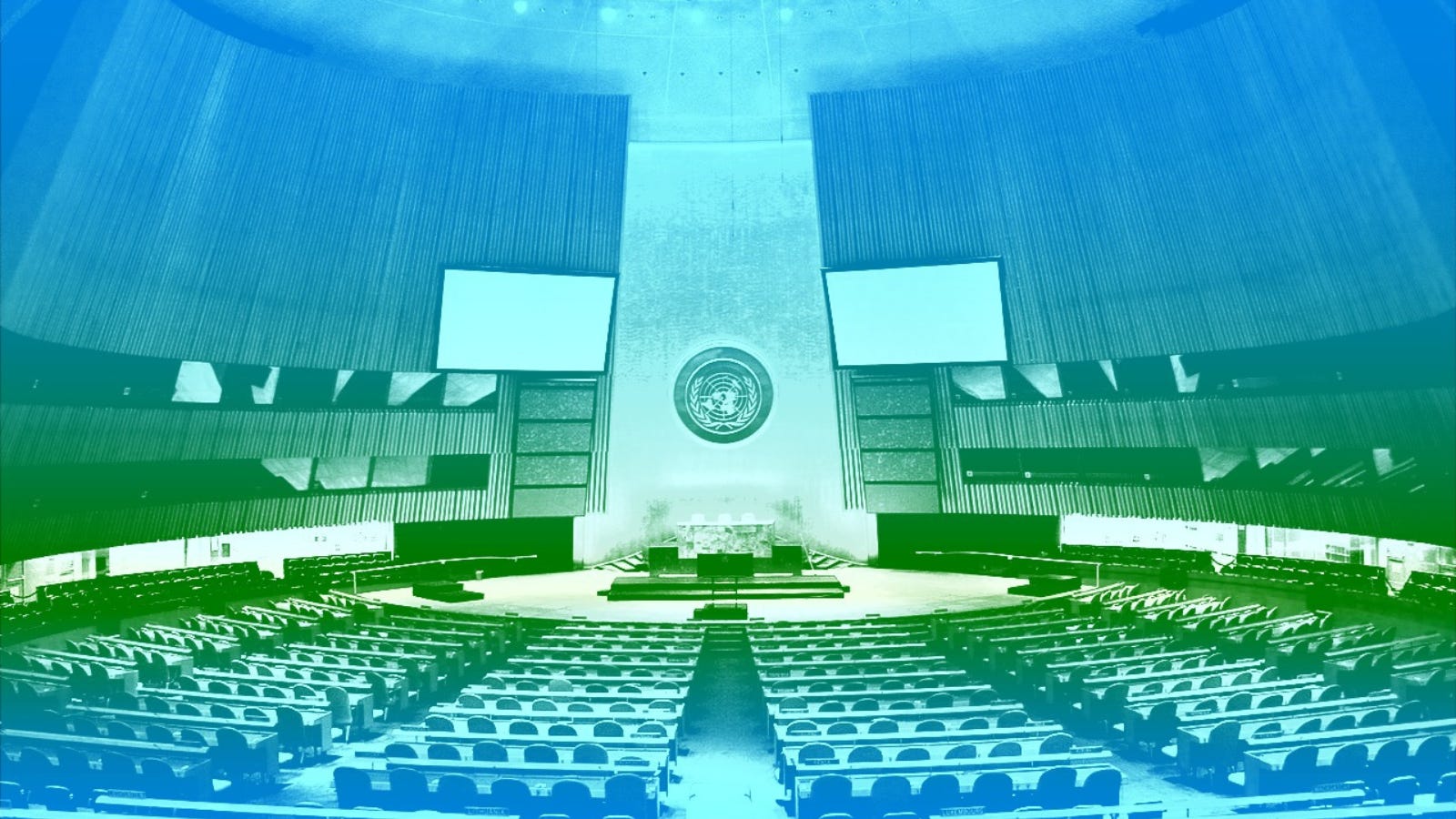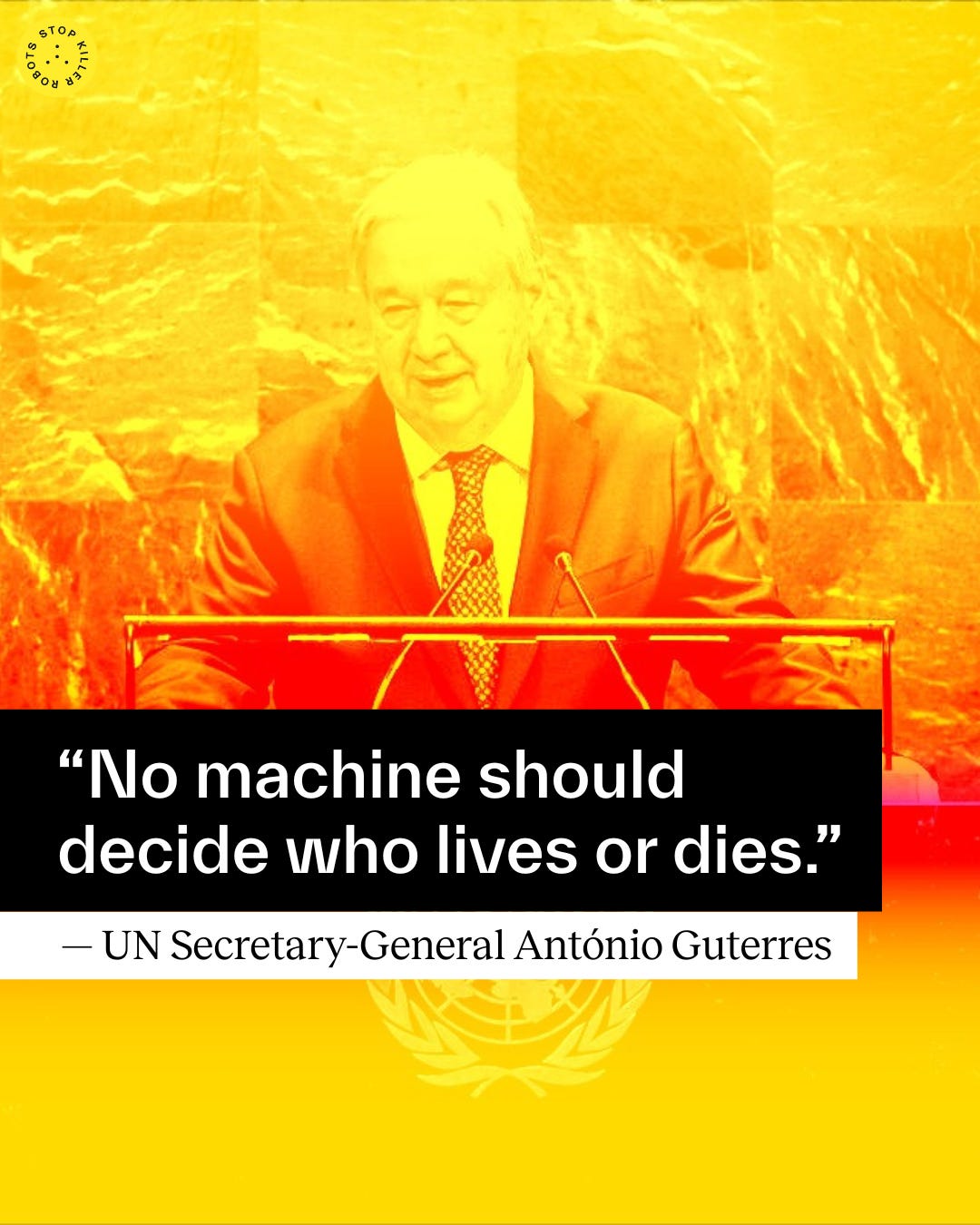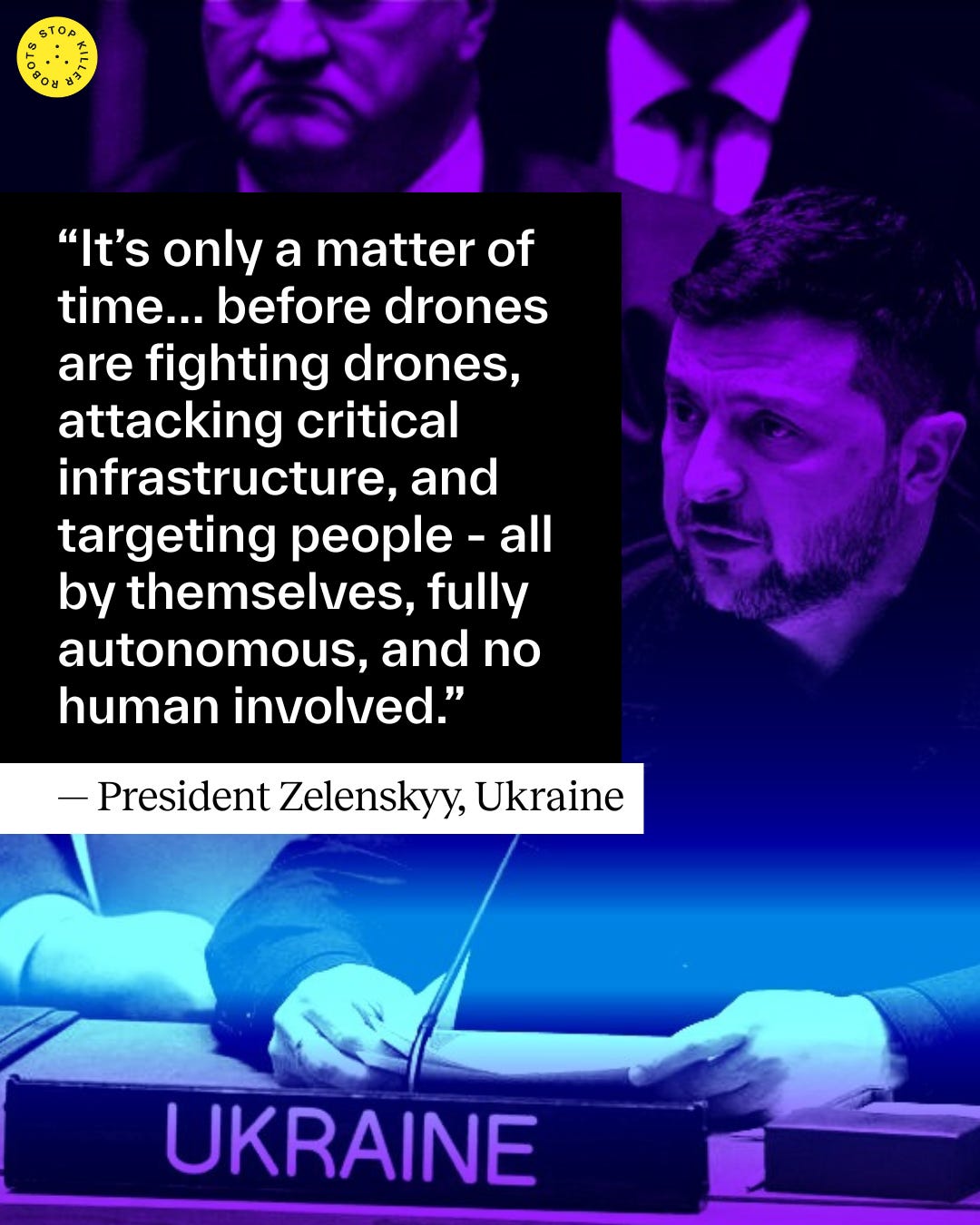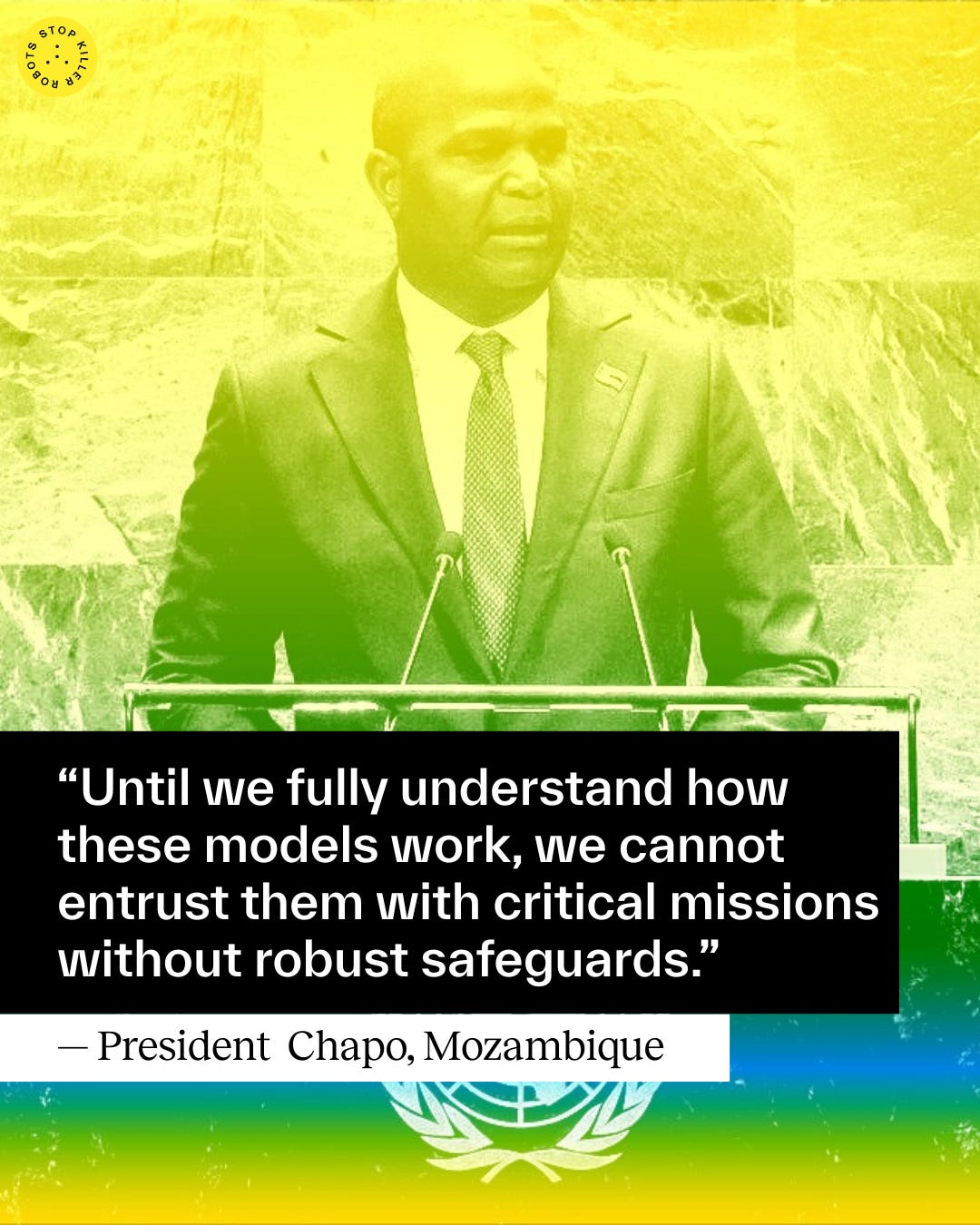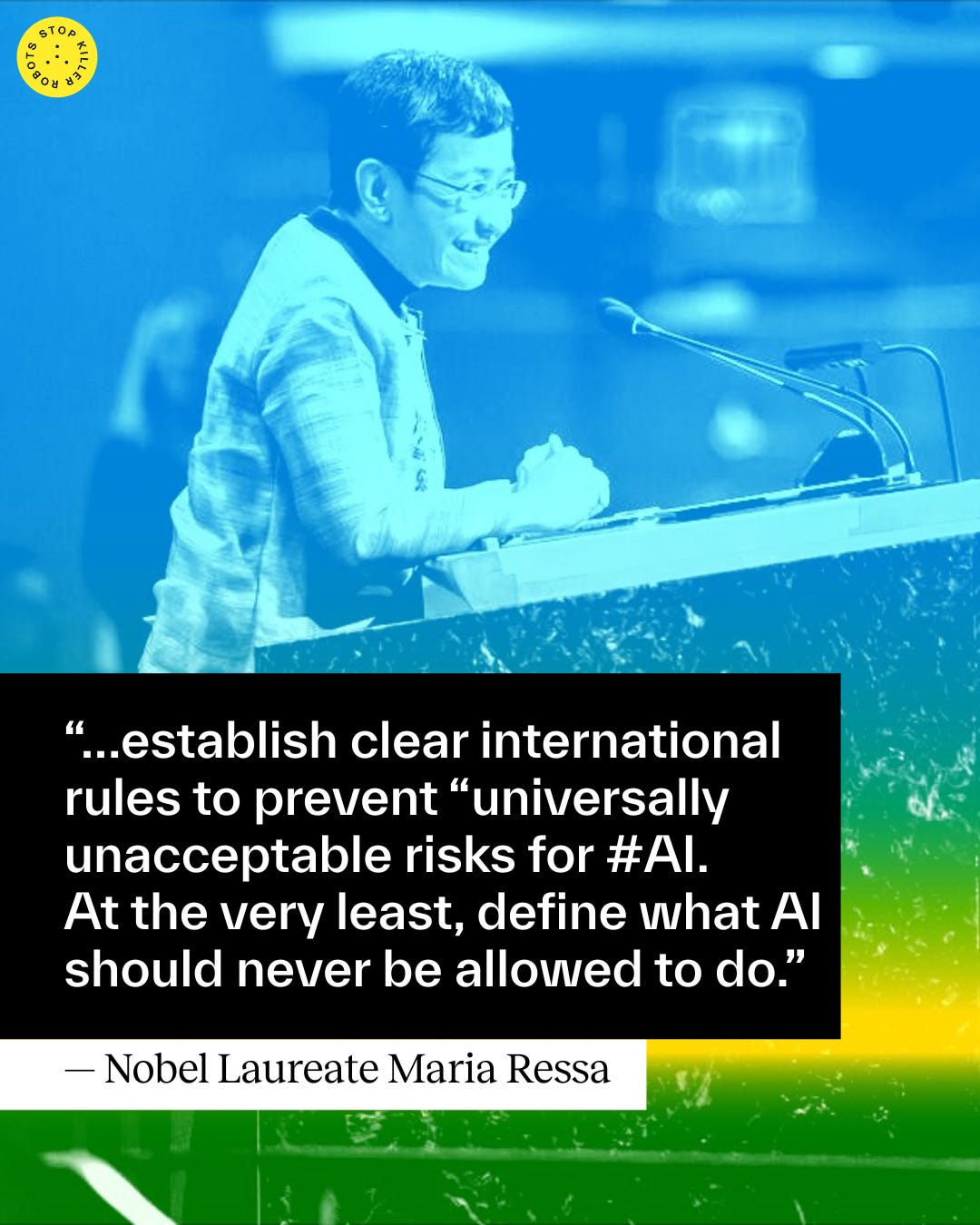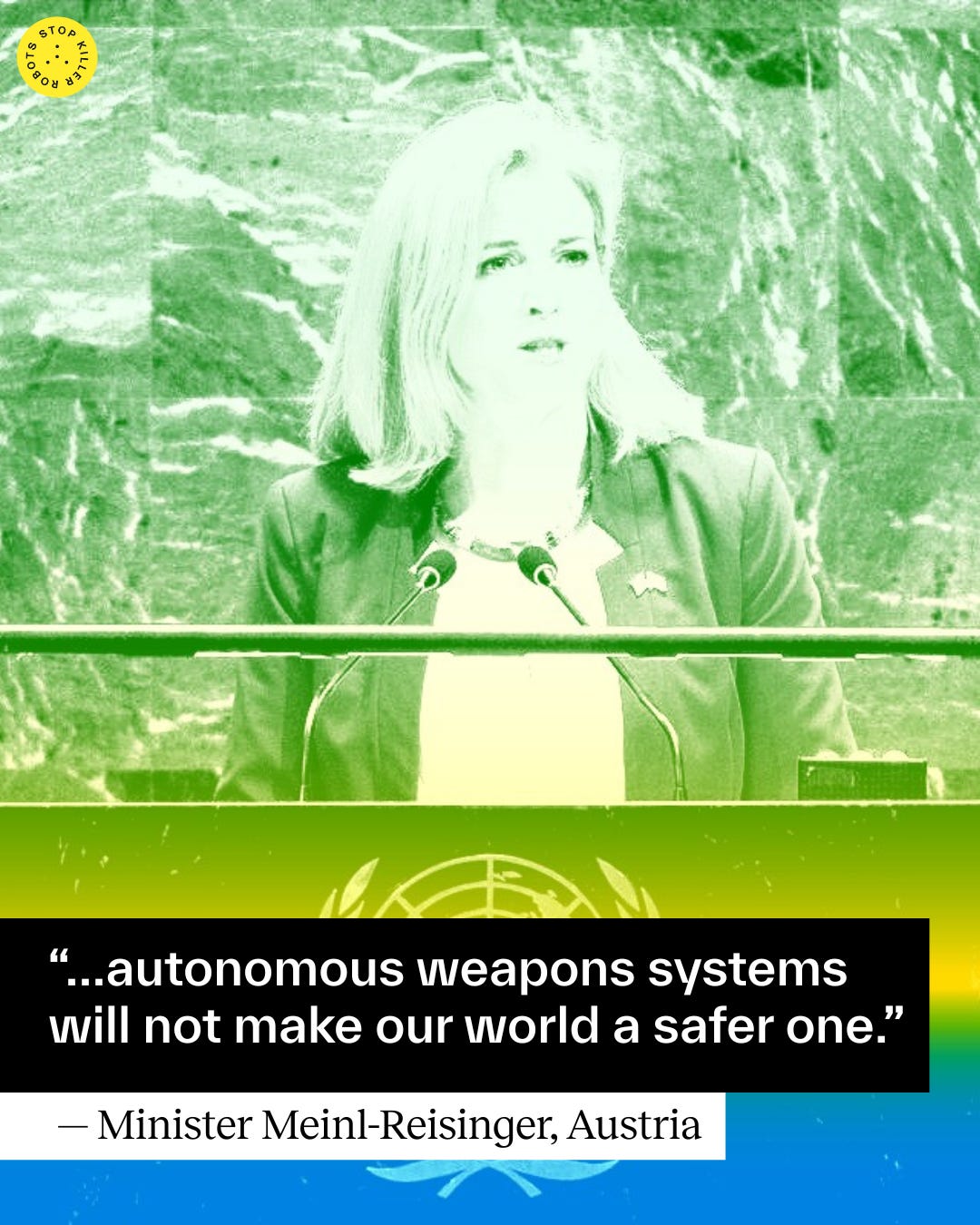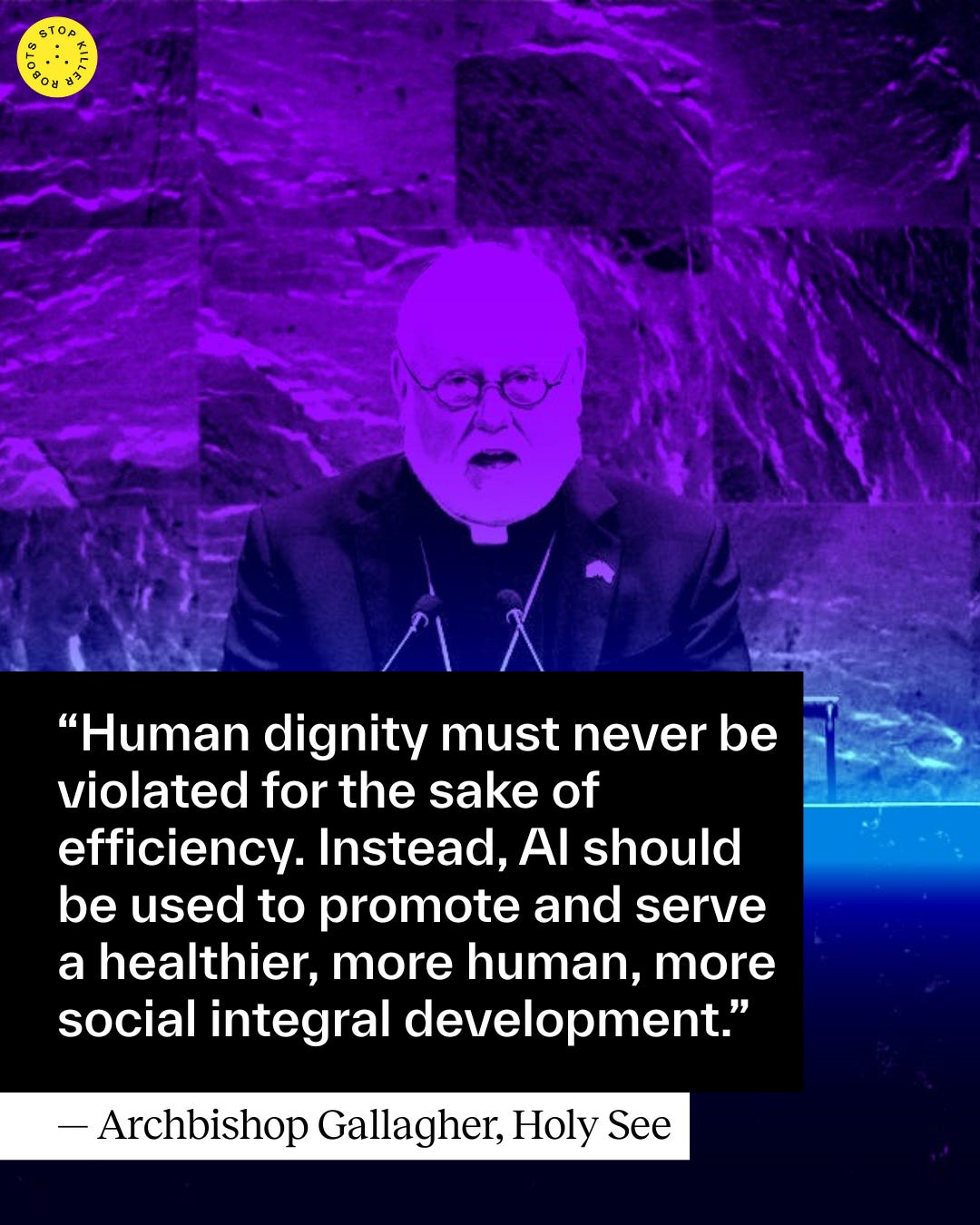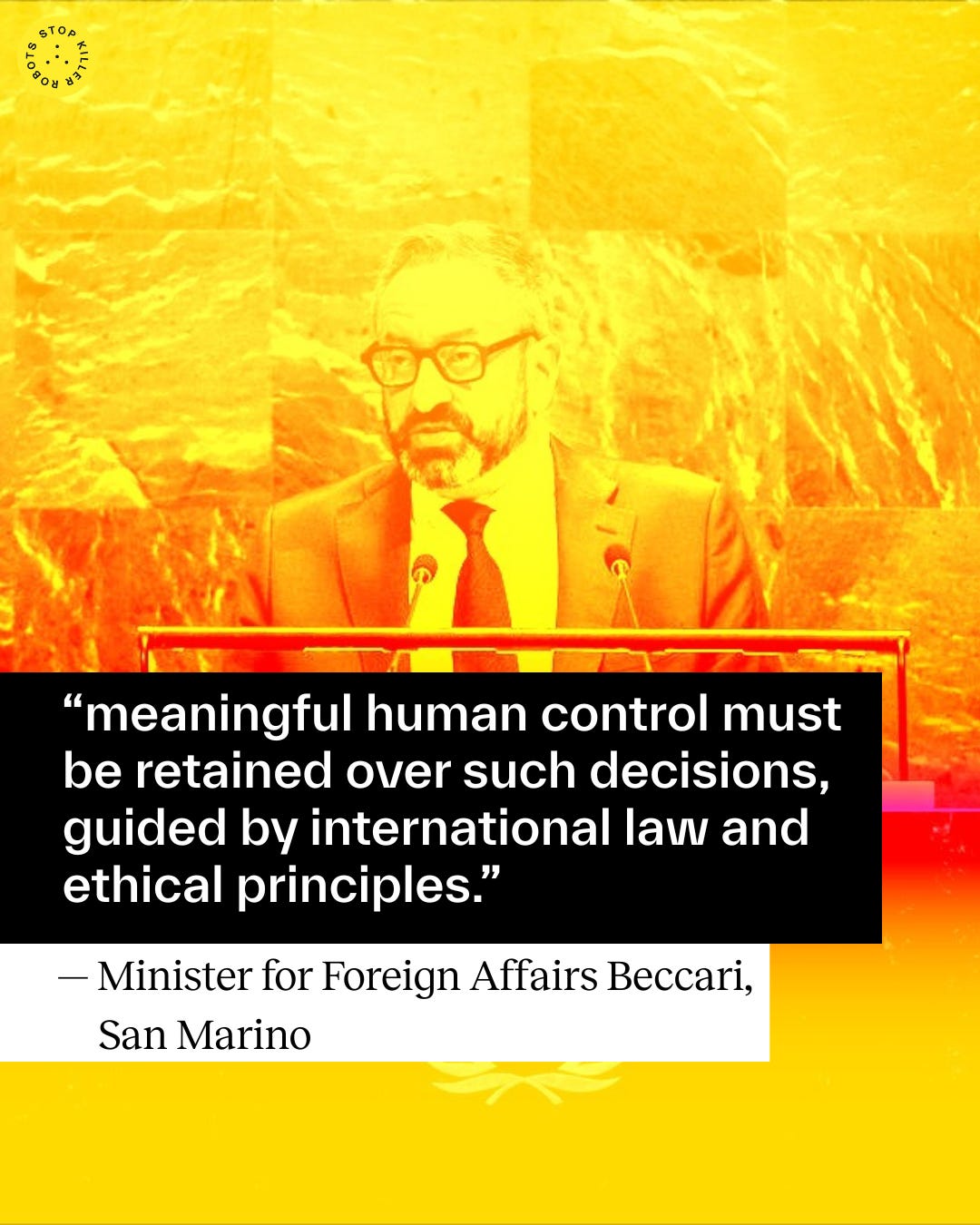"No machine should decide who lives or dies”
What states said about autonomous weapons and military AI at UN High Level week.
High Level Week at the UN General Assembly (UNGA) concluded on Tuesday. A lot happened, from notable recognition of a Palestinian state by several Western powers to a certain world leader speaking 45 minutes over the 15-minute time limit. However, #StopKillerRobots campaigners were paying attention to what states had to say about AI regulation, particularly in the military domain. Over the last 9 days, 22 -30 September, the international community has made clear that 80th UNGA must address the risks posed by unregulated AI.
We’ve been listening closely to what states, academia and civil society have said and compiled some of the key statements and what they mean for our work to regulate autonomous weapons — weapons that have the capacity to select, target and strike targets (people, places etc.) without human control.
1. Secretary-General António Guterres: “No machine should decide who lives or dies”
In opening #UNGA80, António Guterres made it clear: “No machine should decide who lives or dies.” He also warned about the widening gap between #AI innovation and regulation and the growing risks “from biotech to #AutonomousWeapons”
The Secretary-General’s leadership on this issue has been crucial in keeping the topic of autonomous weapons front of mind for diplomats and world leaders. The fact that he highlighted autonomous weapons in his opening statements shows the urgency of creating new international law to govern how these weapons can be used within existing legal frameworks and in a way that protects against civilian harm and digital dehumanisation.
2. President Volodymyr Zelenskyy: “It’s only a matter of time”
During the General Debate, the Ukrainian President highlighted the speed of military AI development said:
“…it’s only a matter of time - not much - before drones are fighting drones, attacking critical infrastructure, and targeting people - all by themselves, fully autonomous, and no human involved - except the few who control AI systems.”
Over the last few years, military AI has become increasingly integrated into the way ongoing conflicts are fought from Ukraine to Gaza. We have already seen the devastating humanitarian impacts of the use of AI tools in conflict and we need to set red lines now to prevent further harm. As President Zelenskyy says ”we need global rules now for how AI can be used in weapons.”
3. Minister of Foreign Affairs Tinoco : “No algorithm should ever make life-or-death decisions.”
Costa Rica’s Minister for Foreign Affairs and Worship said:
“One application of AI that deserves special attention is autonomous weapons systems. Costa Rica urges the conclusion, before 2026, of a legally binding instrument that establishes prohibitions and regulations for autonomous weapons systems capable of identifying, selecting, and attacking targets without meaningful human control. No algorithm should ever make life-or-death decisions.”
Costa Rica has championed autonomous weapons regulation. In 2023 it hosted a regional conference which concluded with the Bélen Communiqué, which called for “the urgent negotiation of an international legally binding instrument on autonomy in weapons systems.”
4. President Chapo: “[Autonomous weapons] pose new challenges to the defence of human dignity”
Mozambique’s President Daniel Francisco Chapo said
“Artificial Intelligence and other emerging technologies offer extraordinary opportunities, but also serious risks of exclusion, manipulation and even militarisation through autonomous weapons. These advances pose new challenges to the defence of human dignity, justice and labour. Until we fully understand how these models work, we cannot entrust them with critical missions without robust safeguards… Africa, can and must take an active role in defining international norms and standards, formulating principles of scientific ethics and determining research priorities, ensuring that technological innovation is always at the service of humanity.”
Mozambique’s statement demonstrates the general regional position of their region — legal safeguards on autonomous are needed now. Indeed many states in the global south, where are autonomous weapons are more likely to be used than produced, have taken a similar position on the urgency of regulation. With 129 of the 193 states at the UN, agreeing that there should be a legally binding treaty on autonomous weapons, it’s clear that there is desire to make an autonomous weapons treaty a reality.
5. Nobel Laureate Maria Ressa: “At the very least, define what AI should never be allowed to do.”
Nobel Laureate and journalist Maria Ressa urged states to establish clear international rules to prevent “universally unacceptable risks for #AI. At the very least, define what AI should never be allowed to do.” During her statement, she launched the AI Red Lines call, which has broad support from former heads of state as well as leaders in policy, industry, policy and academia like Nobel Laureate Geoffrey Hinton, Fmr. High Commissioner of Human Rights, Mary Robinson, and Turing Award Winner Yoshua Bengio, and Fmr. Greek Minister of Finance Yanis Varoufakis.
“Governments must act decisively before the window for meaningful intervention closes. An international agreement on clear and verifiable red lines is necessary for preventing universally unacceptable risks.” – excerpt from AI Red Lines call
6. Minister for European and Int’l Affairs Beate Meinl-Reisinger: “we must ban weapons which kill indiscriminately.“
Minister Meinl-Reisinger said:
“Against the backdrop of rising insecurity and armed conflicts, countries are now heavily investing in security and defense - also in Europe. We all have the duty to protect our citizens. This is necessary, as we are confronted with the biggest war on our continent since 1945. But let us not fool ourselves: growing nuclear arsenals or uncontrolled autonomous weapons systems will not make our world a safer one. While we all must ensure the safety and security of our populations - we must never give up on international humanitarian law and we must ban weapons which kill indiscriminately.”
Austria is another champion for Autonomous Weapons regulation, having tabled two successful resolution on the topic at the UNGA meetings in 2023 and 2024. They also hosted the largest International meeting “Humanity at the Crossroads” on the topic outside of the UN in Vienna in 2024.
7. Archbishop Paul Richard Gallagher, Secretary for Relations with States: “human dignity must never be violated for the sake of efficiency.“
Archbishop Gallagher said:
“There is a risk that AI will promote the ‘technocratic paradigm’, which views all of the world’s problems as being solvable through technology alone. This paradigm often subordinates human dignity and fraternity in the pursuit of efficiency, disregarding the essential dimensions of goodness and truth. However, human dignity must never be violated for the sake of efficiency. Instead, AI should be used to promote and serve a healthier, more human, more social integral development.
“Despite the immense potential that AI offers for advancing human well-being, AI cannot ever end up supplanting human moral and ethical judgment or diminishing the unique value of the person.The Holy See underscores the need to develop and implement clear ethical guidelines and regulatory frameworks for AI that safeguard human dignity, ensure transparency, promote accountability, and foster inclusion.”
In his statement, the Archbishop also mentioned Pope Leo XIV’s comments that “artificial intelligence that poses new challenges for the defence of human dignity, justice and labour.” Previously Pope Francis took a strong stand against autonomous weapons The previous Pope, took a strong stance calling for a ban on autonomous weapons, stating “no machine should ever choose to take the life of a human being.”
8. Minister for Foreign Affairs Beccari: “Artificial Intelligence has been used in conflicts to select targets and make decisions over life or death“
Minister Beccari said:
“We are worried about the risks related to new technologies in the military domain. The rapid advances in artificial intelligence have led to concerning levels of autonomy in conflicts. Artificial Intelligence has been used in conflicts to select targets and make decisions over life or death. San Marino believes that meaningful human control must be retained over such decisions, guided by international law and ethical principles.”
9. Minister for Foreign Affairs, Prince Faisal bin Farhan Al Saud: “The Kingdom warns of the dangers of military uses of artificial intelligence applications and autonomous weapons.“
Minister bin Farhan Al Saud said:
“The Kingdom warns of the dangers of military uses of artificial intelligence applications and autonomous weapons, and the necessity of enacting international laws that regulate them.”
While Saudi Arabia is among the 54 states that has not formally declared support for new international law on autonomous weapons systems, it is encouraging to see their support in this forum for a form of international legal regulation.
These statements about the need to regulate Military AI and autonomous weapons set the tone for this years UNGA and make it clear that progress on this issue must happen urgently. The Secretary-General also reiterated his call for “a ban on lethal autonomous weapons systems operating without human control, with a view to concluding a legally binding instrument by next year.” He and the President of the International Committee of the Red Cross made this landmark call back in 2024 and the pressure is on states to make this a reality.
They’ll have an opportunity to move toward this this at the First Committee of Disarmament and International Security, which begins next week on 8 October. We’ll be on the ground in New York and will be participating in discussion on autonomous weapons in this forum, which has proven fruitful in the past with a 2023 resolution mandating a UN Report on Autonomous Weapons and a 2024 resolution mandating consultations in May of this year where all states were able to participate equally and discuss the full range of issues posed by autonomous weapons (instead of only the military scope as in Geneva discussions).
Agreeing new international law on autonomous weapons systems is urgent, and it is possible now: the majority of the world’s countries support it, and increasing numbers agree they now have enough common ground to start negotiations. Time is running out and states know what they need to do.


